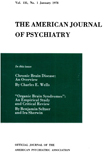THERAPEUTIC PROGRAMMING FOR THE NON-PSYCHOTIC PATIENT
Abstract
Forty-seven patients suffering from personality disorders manifested through somatic symptoms or behavioral crises were treated by short-term hospitalization on a ward reserved primarily for acute psychotic disorders. The patients had been refractory to previous treatment approaches.
The average hospitalization lasted 16 days and consisted of a highly structured program designed to restore the patient to social functioning and to provide a setting and a vocabulary for converting somatic and behavioral expression into verbal expression. Family members were involved in the treatment.
In most of the cases there was a complete loss of presenting symptoms and disturbance at the time of discharge. A follow-up study 18-30 months after discharge revealed that the gains persisted in 2/3 of the group evaluated.
The results are attributed to specific social, psychological, and educational processes requiring a particular kind of ward structure and staff attitude for successful results.
Access content
To read the fulltext, please use one of the options below to sign in or purchase access.- Personal login
- Institutional Login
- Sign in via OpenAthens
- Register for access
-
Please login/register if you wish to pair your device and check access availability.
Not a subscriber?
PsychiatryOnline subscription options offer access to the DSM-5 library, books, journals, CME, and patient resources. This all-in-one virtual library provides psychiatrists and mental health professionals with key resources for diagnosis, treatment, research, and professional development.
Need more help? PsychiatryOnline Customer Service may be reached by emailing [email protected] or by calling 800-368-5777 (in the U.S.) or 703-907-7322 (outside the U.S.).



